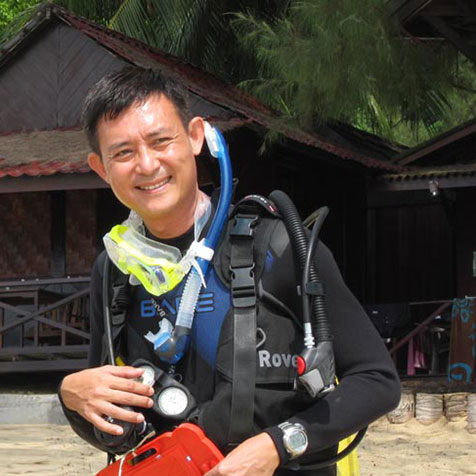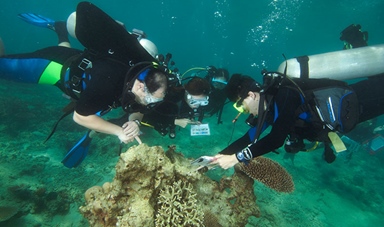Loading component...
At a glance
By Katie Langmore
There aren’t many desk jobs that will pay you to train as an EcoDiver, and this, says Jit Cheng Lim CPA, is a strong selling point at KPMG Malaysia.
Lim, who is executive director (advisory), says KPMG has many corporate social responsibility (CSR) projects, but it is the company’s work for Reef Check Malaysia that he is particularly passionate about. It is also the project that attracts the attention of finance graduates.
“When we go to the universities to meet with potential employees, we have a poster of scuba divers that always grabs the attention of the students,” he laughs.
The diving experience is an added benefit to a CSR project that provides crucial, dedicated surveillance work of the reefs of Tioman Island in Malaysia.
“A colleague came to me 13 years ago and told me about Reef Check Malaysia, suggesting we get involved,” recalls Lim.
“Reef Check International – the largest reef monitoring agency in the world, based in California – needs data on reefs around the world. To get it, they recognised they could just equip divers with training to support their work. So, anyone who can dive and takes their course can do surveillance for the organisation and log their data.”

KPMG Malaysia came on board, adopting two popular reefs off Tioman Island for the EcoDive project – Renggis Reef and Soyak Reef. Now, every year, the company nominates six to nine staff members who can already dive to undergo three days of training to obtain their EcoDiver qualifications, with a test at the end of the third day. On the fourth day, they collect data for Reef Check International.
“There are three areas of surveillance – fish, invertebrates, and substrates,” says Lim, who manages the team each year. “There are many kinds of fish that we count, many kinds of invertebrates – sea cucumbers, sea urchins, for example – and substrates, such as hard and soft corals.
“It’s great, but it’s a lot of work – lugging a tank in and out of the water all day, memorising fish and coral, remembering data to record – I feel ‘gassed out’ by the end of the day.”
The team’s ongoing surveillance of live coral cover measures the population of endangered species, the health of the coral and the reef’s ecosystems. “From 2015 to 2019, we’ve seen that the health of the reef has been declining,” says Lim, adding that this is due to pollution, the recent El Niño and extreme weather events due to climate change.
With the data in hand, Reef Check Malaysia makes recommendations to the government on how to preserve the health of the country’s reefs.
EcoDive surveillance is not the only project Lim and his team have done for Reef Check.
“We used to do a program called Rainforest to Reef, where we would go into primary schools and teach children about ecosystems. We would do activities with them and teach them things like the impact of rubbish on the reef; that everything you do on land is interconnected with the oceans.”
The KPMG team has also initiated a major beach clean-up, calling on local councils and drawing out residents of the region to help. “We found so much rubbish,” exclaims Lim.
“Malaysia is at the tip of ‘the coral triangle’, offering some of the most beautiful reefs in the world. We’ve trained about 100 divers, and all of them say, it’s such a heritage we have, it’s crucial we do our bit and work to save it.”
CPA Australia resource:
Get your scuba gear ready!
Reef Check International has teams in more than 90 countries working to protect tropical coral reefs through education, research and conservation. The organisation invites active divers to take its three-day EcoDiver course and help survey the health of local reefs

